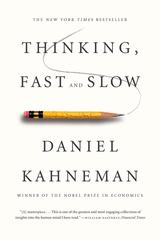 Daniel Kahneman, "who never took an economics course but who pioneered a psychologically based branch of that field that led to a Nobel in economic science in 2002," died March 27 at age 90, the New York Times reported. Kahneman, who was long associated with Princeton University, "employed his training as a psychologist to advance what came to be called behavioral economics. The work, done largely in the 1970s, led to a rethinking of issues as far-flung as medical malpractice, international political negotiations and the evaluation of baseball talent, all of which he analyzed, mostly in collaboration with Amos Tversky, a Stanford cognitive psychologist who did groundbreaking work on human judgment and decision-making."
Daniel Kahneman, "who never took an economics course but who pioneered a psychologically based branch of that field that led to a Nobel in economic science in 2002," died March 27 at age 90, the New York Times reported. Kahneman, who was long associated with Princeton University, "employed his training as a psychologist to advance what came to be called behavioral economics. The work, done largely in the 1970s, led to a rethinking of issues as far-flung as medical malpractice, international political negotiations and the evaluation of baseball talent, all of which he analyzed, mostly in collaboration with Amos Tversky, a Stanford cognitive psychologist who did groundbreaking work on human judgment and decision-making."
Kahneman's public reputation was bolstered by his 2011 book, Thinking, Fast and Slow, which appeared on bestseller lists in science and business. He "propagated his findings with an appealing writing style, using illustrative vignettes with which even lay readers could engage," the Times noted. His most recent book was Noise: A Flaw in Human Judgment (2021), written with Cass Sunstein and Olivier Sibony.
Harvard psychologist and author Steven Pinker told the Guardian in 2014: "His central message could not be more important, namely, that human reason left to its own devices is apt to engage in a number of fallacies and systematic errors, so if we want to make better decisions in our personal lives and as a society, we ought to be aware of these biases and seek workarounds. That's a powerful and important discovery."
Kahneman shared his 2002 Nobel Prize in economic science with Vernon L. Smith of George Mason University in Virginia. President Barack Obama presented the Presidential Medal of Freedom to him at the White House in 2013.
"Before Kahneman and Tversky, people who thought about social problems and human behavior tended to assume that we are mostly rational agents," columnist and author David Brooks wrote in 2011. "They assumed that people have control over the most important parts of their own thinking. They assumed that people are basically sensible utility-maximizers, and that when they depart from reason it's because some passion like fear or love has distorted their judgment." But Kahneman and Tversky "yielded a different vision of human nature," Brooks continued. "We are players in a game we don't understand. Most of our own thinking is below awareness."
In an interview with Kara Swisher on her Times podcast Sway in 2021, Kahneman said, "If I were starting my career now, I would be choosing between artificial intelligence and neuroscience, because those are now particularly exciting ways of looking at human nature."

